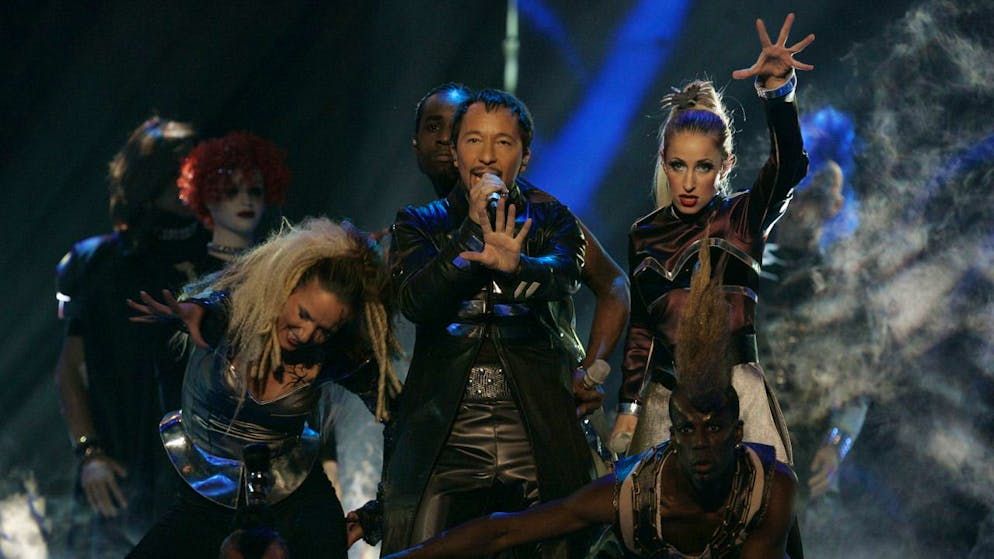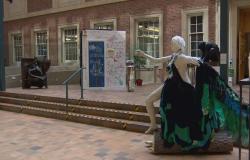Argovian Lys Assia won the first Eurovision contest in 1956 with “Refrain” (archives).
Céline Dion won Eurovision for Switzerland in 1988 (here with composer Atilla Sereftug and singer Nella Martinetti, author of the text for “Ne partez pas sans moi”) (archives).

In 2007, Eurodance icon DJ Bobo and his vampires missed the final, despite their favorite status (archives).

Pepe Lienhard placed 6th with “Swiss Lady” in 1977 (archives).

In 2004, Piero Esteriore did not obtain a single point with his title “Celebrate” (archives).

Before becoming a children’s idol, Henri Dés obtained a good 4th place in 1970 (here during qualifying for Eurovision 1976, archives).
Switzerland’s “tops” and “flops” at the Eurovision contest – Gallery

Argovian Lys Assia won the first Eurovision contest in 1956 with “Refrain” (archives).

Céline Dion won Eurovision for Switzerland in 1988 (here with composer Atilla Sereftug and singer Nella Martinetti, author of the text for “Ne partez pas sans moi”) (archives).

In 2007, Eurodance icon DJ Bobo and his vampires missed the final, despite their favorite status (archives).

Pepe Lienhard placed 6th with “Swiss Lady” in 1977 (archives).

In 2004, Piero Esteriore did not obtain a single point with his title “Celebrate” (archives).

Before becoming a children’s idol, Henri Dés obtained a good 4th place in 1970 (here during qualifying for Eurovision 1976, archives).
With his song “The Code”, the Biel-based artist Nemo is a favorite in the 68th Eurovision Song Contest, the final of which will take place in two weeks in Malmö. Switzerland won the competition twice, but often did not even reach the final.
It was the Argovian Lys Assia (1924-2018) who won the first Eurovision song contest with “Refrain”, which took place in Lugano in 1956. But at the time, the competition was much less important , with only seven participating countries.
The Swiss also represented her country in the following two editions. She ranked second in 1958 in the Netherlands with the song “Giorgio.” She wanted to run again in 2012, but she was unsuccessful in the preselection. In his place, brother duo Sinplus represented Switzerland in Baku, but failed to qualify for the final.
Lys Assia is to date the only Swiss woman to have won the grand prize. The second Swiss victory was ensured by Quebecer Céline Dion in 1988, with the title “Ne partez pas sans moi”. Switzerland edged England by one point at the 33rd edition of the competition in Dublin. The lyrics of the song were written by the great lady of Swiss popular music Nella Martinetti.
Difficult times in the 2010s
If everything went well in 2019 with the fourth place of Bernese Luca Hänni and in 2021 with the third place of Friborg Gjon’s Tears, Switzerland experienced a lean period in previous years.
Between 2007 and 2018, only Anna Rossinelli from Basel in 2011 and Sebalter from Ticino in 2014 reached the final. They finished in 25th and 13th place respectively. In 2007, Eurodance icon DJ Bobo missed the final with “Vampires Are Alive”, despite his status as favorite.
His successors, the Ticino Paolo Meneguzzi in 2008, the Basel rock group Lovebugs in 2009 and the St. Gallen singer Michael von der Heide in 2010 also failed to reach the final. No one managed to break the “curse” in the following years – until 2019.
Switzerland hit rock bottom in 2004, when Piero Esteriore finished last with his track “Celebrate,” which didn’t get a single point.
Loyal subscribers
Like Lys Assia, other artists have participated in the Eurovision contest several times. The Bernese group Peter, Sue & Marc entered the race four times, reaching fourth place in 1976 and 1981. In 1971 and 1979 they reached the final, but not the top places.
One of the members of the trio, Peter Reber, also wrote songs that represented Switzerland at Eurovision: “Swiss Lady”, which would be performed by Pepe Lienhard in 1977 (6th) and “Cinema”, sung by Paola in 1980 (4th).
brbu, ats











